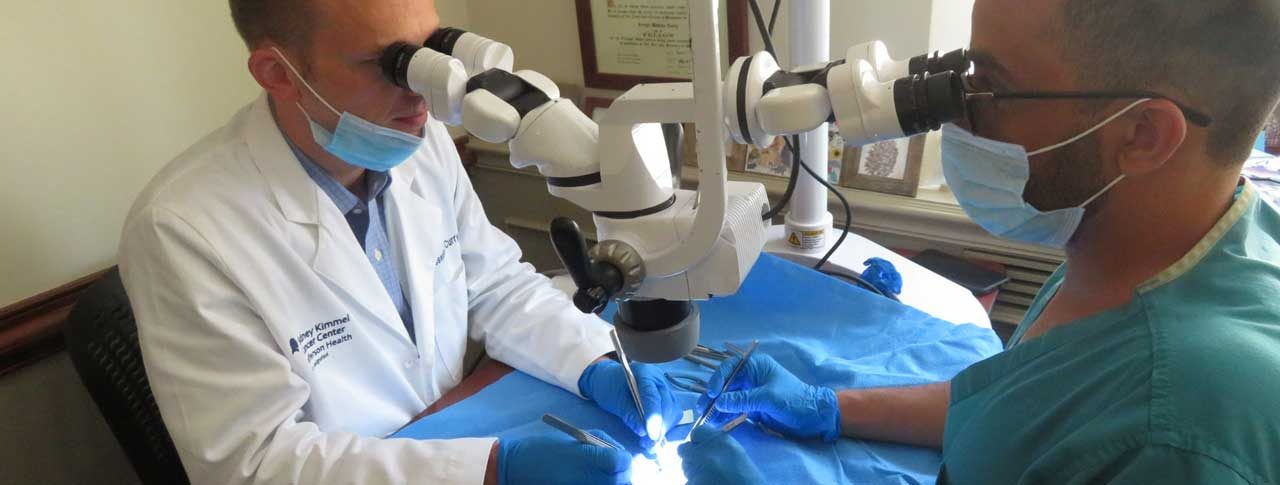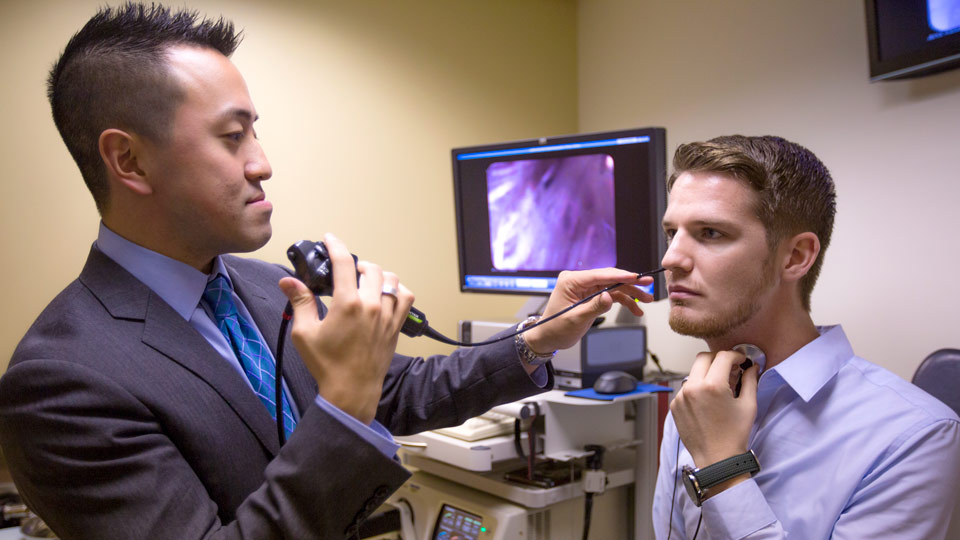Protecting Your Voice: How a Voice Specialist Can Diagnose Dysfunction
Protecting Your Voice: How a Voice Specialist Can Diagnose Dysfunction
Blog Article
Exploring the Area of Otolaryngology: What to Anticipate When You Seek Advice From an ENT
Otolaryngology, generally described as ENT, incorporates the diagnosis and therapy of nose, throat, and ear problems. For those experiencing related issues, seeking advice from an ENT professional can give clarity and alleviation. Recognizing what to anticipate throughout such appointments is essential for effective interaction and care. This overview will certainly lay out vital elements of the ENT experience, consisting of common factors for brows through and the procedures entailed in diagnosis and therapy.

Understanding Otolaryngology: An Overview
Otolaryngology, often described as ENT (Ear, throat, and nose) medication, is a specific branch of medicine that concentrates on the medical diagnosis and therapy of problems influencing these critical areas of the human body. This area includes a large range of problems, including those associated to hearing, equilibrium, respiratory function, and speech. Otolaryngologists are trained to take care of both medical and medical therapies, utilizing innovative techniques and technologies. Their knowledge prolongs past typical conditions, addressing problems such as allergic reactions, sinus infections, and hearing loss. Additionally, they play a vital duty in the management of head and neck cancers, offering complete treatment customized to specific patient needs. Generally, otolaryngology stays vital for preserving health and wellness and top quality of life in damaged individuals.
Typical Reasons to See an ENT Specialist
Many people seek the know-how of an ENT specialist for a selection of reasons, reflecting the varied nature of conditions that affect the ear, throat, and nose. Usual problems include chronic sinus problems, which frequently leads to consistent nasal blockage and face discomfort. Allergies and their associated signs and symptoms, such as sneezing and itching, likewise trigger brows through to these specialists (Otolaryngologist). Hearing loss, whether progressive or unexpected, is an additional substantial factor for examination. On top of that, people might look for evaluation for throat disorders, including consistent hoarseness or swallowing problems. Sleep apnea, characterized by cut off breathing throughout rest, is regularly addressed by ENT experts also. Each of these conditions highlights the importance of specialized care in taking care of intricate ENT-related wellness concerns
Preparing for Your ENT Appointment
When planning for an ENT consultation, it is important to collect appropriate information and think about any specific problems. Individuals must put together a comprehensive case history, consisting of previous ear, nose, or throat concerns, surgeries, and present medications. Documenting symptoms-- such as period, severity, and regularity-- can supply important understandings for the ENT expert. In addition, people must prepare a checklist of concerns they desire to ask, guaranteeing that all problems are attended to throughout the see. Bringing along any appropriate clinical records or test outcomes can further help the ENT in understanding the person's problem. Clients should confirm their visit details, consisting of time, date, and location, to minimize any last-minute complication. Proper preparation can improve the efficiency of the consultation and lead to far better outcomes.
What to Anticipate During the Appointment
As the consultation starts, the client can anticipate to take part in a thorough conversation with the ENT specialist concerning their signs and symptoms and case history. The specialist will certainly ask about the period, frequency, and seriousness of signs and symptoms such as hearing loss, nasal blockage, or sore throat. Furthermore, the individual's previous medical problems, medicines, and any type of appropriate family history will certainly be reviewed, helping the professional in developing a complete understanding of the client's wellness. The ENT might likewise inquire about way of living factors, such as exposure to allergens or toxic irritants. This open discussion develops a structure for the assessment, ensuring that the person's worries are addressed and setting the phase for any type of necessary analyses or referrals for therapy.
Diagnostic Examinations and Treatments in Otolaryngology
A variety of diagnostic examinations and treatments are important in otolaryngology to accurately review and detect problems affecting the throat, nose, and ear. Common tests consist of audiometry, which determines hearing feature, and tympanometry, assessing middle ear stress. Nasal endoscopy allows visualization of the nasal passages and sinuses, while laryngoscopy takes a look at the throat and singing cords. Imaging methods, such as CT scans and MRIs, give comprehensive sights of head and neck structures. Allergy testing might also be performed to determine triggers for sinus or respiratory system concerns. These analysis tools allow ENT specialists to establish a comprehensive understanding of clients' conditions, making sure customized and reliable monitoring strategies. Appropriate medical diagnosis is important for successful therapy results in otolaryngology.
Therapy Options Provided by ENT Specialists
ENT professionals use a variety of therapy choices customized to deal with certain problems impacting the throat, ear, and nose. These treatments article source vary from conservative strategies, such as drug and way of life modifications, to even more invasive procedures. As an example, allergies might be taken care of with antihistamines or immunotherapy, while persistent sinus problems may need nasal corticosteroids or sinus surgery. For hearing loss, ENT professionals often recommend hearing aids or surgical interventions like cochlear implants. In cases of throat conditions, alternatives can consist of speech therapy or surgeries to remove blockages. Furthermore, they might offer assistance for managing sleep apnea, consisting of making use of CPAP devices or medical treatments. In general, the goal is to enhance patients' high quality of life with personalized care and effective therapy approaches.
When to Seek Follow-Up Care With an ENT
Recognizing when to seek follow-up treatment with an ENT specialist is vital for address managing recurring signs and symptoms or complications connected to throat, nose, and ear problems. People need to think about setting up a follow-up consultation if signs persist despite preliminary therapy, such as chronic ear pain, nasal blockage, or throat discomfort. Modifications in hearing, equilibrium problems, or uncommon nasal discharge may additionally necessitate more examination. Additionally, if an individual experiences negative effects from recommended drugs or has actually undertaken an operation, follow-up treatment is important to monitor recovery and deal with any worries. Prompt assessments can guarantee reliable management of conditions, avoid potential issues, and offer tranquility of mind regarding one's health. Seeking follow-up treatment promotes proactive health and wellness monitoring in otolaryngology.
Often Asked Inquiries

What Certifications Should I Look for in an ENT Specialist?
When seeking an ENT specialist, one need to search for board qualification, pertinent experience, and strong client evaluations. In addition, reliable interaction skills and a caring method can greatly boost the total treatment experience.
Exactly how Do I Pick the Right ENT for My Requirements?
Selecting the right ENT professional entails examining their qualifications, experience, and person reviews (Otolaryngologist). It is vital to consider their communication design and approach to therapy, ensuring they line up with the person's certain health needs and choices
Are There Any Dangers Related To ENT Procedures?
The risks connected with ENT treatments might consist of infection, bleeding, anesthesia problems, and potential damage to surrounding frameworks. Patients need to talk about these risks with their medical professional to recognize individual problems and warranty notified choices.
Just How Can I Take Care Of Stress And Anxiety Before My ENT Visit?
To take care of anxiety prior to an appointment, people can exercise deep breathing workouts, picture favorable results, prepare concerns ahead of time, and seek support from friends or family, promoting a sense of reassurance and calmness.
What Should I Do if I Experience Negative Effects From Treatment?
The person needs to quickly report them to their medical care provider if side effects from treatment occur. Adjustments to treatment or added interventions may be necessary to guarantee safety and efficiency in handling their problem - ENT Doctor. As the assessment starts, the client can expect to involve in a thorough conversation with the ENT specialist concerning their signs and clinical history. These analysis tools allow ENT experts to develop a thorough understanding of patients' conditions, making sure customized and effective administration strategies. ENT experts supply a variety of therapy alternatives tailored to read this address specific problems impacting the nose, ear, and throat. When seeking an ENT expert, one should look for board accreditation, relevant experience, and strong client testimonials. Selecting the best ENT expert includes examining their credentials, experience, and patient testimonials
Report this page